A LUMINOUS NIGHT MUSIC
I’m a little dizzy, bubbly—not from any reception champagne, mind you, but from seeing my very first production of A Little Night Music. It’s left me floating. (The music, I confess, is still coursing through me; I hope they don’t ask for it back.) With its 20 cast members and 22-piece orchestra, this full-scale production of the 1973 Tony Award-winning musical is a perfect way to celebrate the show’s 50th anniversary. The work is the second mainstage production in Pasadena Playhouse’s six-month-long Sondheim Celebration honoring the late Stephen Sondheim, the famed composer and lyricist who redefined the American musical. (Sondheim died at 91 in 2021.) Having just reviewed the festival’s sensational Sunday in the Park with George and attended the community-wide choral celebration Song by Song by Sondheim, I’ve been neck-deep in all things Sondheim lately, and this production only fuels my love for his artistry. Directed by David Lee, A Little Night Music sets a high bar, offering further proof that Pasadena Playhouse holds premier status in the L.A. theater landscape.
The work was originally produced and directed for Broadway by long-time Sondheim collaborator, Harold Prince. With a book by Hugh Wheeler and music and lyrics by Stephen Sondheim, the musical is inspired by Smiles of a Summer Night (1955), a film written and directed by Swedish auteur Ingmar Bergman. Like Shakespeare’s A Midsummer Night’s Dream, Night Music (and Smiles before it), is a dizzying meditation on love and human folly. Taking place in 1900s Sweden, the musical opens with an operatic “Greek Chorus” (Jared Bybee, Georgia Belmont, Oriana Falla, Arnold Geis, Kimberly Dawson) harkening the main players to “remember” love’s goodness — as if characters in a musical farce ever listened to the wisdom of muses. Night Music follows a tangled web of lovers (or would-be lovers) leading up to — and over the course of — “A Weekend in the Country” (the Act I company closer). Love, deceit, and desire are woven, and untangled, as characters gracefully stumble through life’s complexities. Wheeler’s book and Sondheim’s lyrics heighten the laughs found in Bergman’s source material. And yet, Night Music also beautifully hones in on the tragic, as Sondheim so often insists. Characters, even archetypes, are layered and rich.
If the musical has a “sun” whom all other characters orbit, it’s the glamorous Desirée Armfeldt (a stunning Merle Dandridge). Yet even Desirée — the aging actress who holds court on countless stages, and holds hearts (and other parts) of at least two men in the meanwhile — can’t escape the gravitational pull of her single, sage-like mother, Madame Armfeldt (a regal Jodi Long) whose sordid past offers Desirée a hint at, or warning of, her own potential future. When lawyer and former lover Fredrik Egerman (a meritable Michael Hayden), brings his new 18-year-old “trophy wife,” Anne (a spritely Kaley Ann Voorhees), to a production of Desirée’s latest play, jealousy erupts in a household already rife with tension, setting off a chain of events that leaves our players whirling and twirling till curtain.
One such player is Fredrik’s son, Henrik (Chase Del Rey), a libidinous seminary student a year older than his father’s new wife. In the song “Later,” the second part of a contrapuntal trio involving father, son, and (holy) stepmother, Henrik, through cello and voice, explodes his frustrations. Del Rey, with his brooding good looks, brings a palpable intensity to a role straight out of Spring Awakening, fighting off demons of desire, grappling with the need to be taken seriously.
As Countess Charlotte Malcom, the wife of dragoon Count Carl-Magnus Malcom (a cocksure, love-to-hate-him Ryan Silverman), Sarah Uriarte Berry is exquisite. She takes Charlotte from a cheated-on, put-upon wife (yes, Desirée’s homewrecking knows no bounds) to a confident, comical scene-stealer. Giving another transformative performance is Ruby Lewis as the Egerman family maid, Petra. This fun, seemingly throwaway character gets her moment to shine when her flirtatious nature boils over in Act II’s breathtaking “The Miller’s Son.” After a tussle in the hay with a hunky manservant (sleeve-breaker Adam James King as “Frid”), Lewis delivers a full-throated dazzler, belting with fiery certainty the desires of a woman who, on the way to a presumed future marriage, wants to taste, fully, every minute of her … “meanwhile.”
Much of the score (in the full, original orchestrations by Jonathan Tunick) is baroquely layered. Music Director Alby Potts, under the supervision of Darryl Archibald, conducts it all expertly. Nearing the end of the work, waltzing melodies make way for the highly anticipated showstopper: “Send in the Clowns.” That’s where Sondheim slows down, takes a breath, and displays his melodic and lyrical genius in a seemingly simpler fashion. To be a stickler for a moment (bear with me): the dialogue spoken before “Clowns,” as underscore swells, is slightly under-baked and unclear, making it difficult for the actress playing the role to earn the song’s magnitude. It’s not until the second half of the song that further dialogue, once again spoken to her, makes her initial emotions clear. That said, “Send in the Clowns” is where Dandridge, who has up to this moment already proven herself a powerful presence … soars. “Isn’t it rich?” she sings. And that’s when, at the biggest moment in the show, on Opening Night, I swear to god, a fucking cell phone goes off. (“Isn’t it rich?” indeed.) Dandridge, unperturbed, proceeds without a blink as the patron, finally, turns the damn thing off. “Are we a pair? … Me here at last on the ground, you in … mid-air.” My god, Sondheim loves to murder us with irony. “Send in the clowns,” Dandridge croons, crescendoing and retreating with a haunting vibrato, killing us all the same. On top of all of this—Wilson Chin and Jared A. Sayeg being the (respective) set- and lighting-designer pros that they are—a wooded forest under a gorgeous, moonlit night sky is the backdrop for all of this. It’s positively glorious: marking an absolute star turn for Dandridge.
That the second act nears completion before loose ends get (mostly and quickly) tied is one of the show’s weaker points. Still, this production, with its lavish sets, inventive props, stunning period costumes (Kate Bergh), and a team of over 100 local theatermakers coming together to pull it all off … is a sight to behold. It’s refreshing, I must say, for a theater to treat adults as adults, leaning into the sophisticated. Amid a sludge of showy, saccharine spectacles (or worse, the self-applauding “social justice” snoozers that theaters, as of late, have been foisting upon audiences as if to fearfully say: see, I’m not the problem!), the timeless universality of this work—with or without the modern, race-blind casting that’s well-executed here—is undeniable. Credit is due to Pasadena Playhouse’s Producing Artistic Director, Danny Feldman, who has revived the century-old “State Theatre of California” in countless ways, enriching a growing community in the process. Seeing theaters pour money into works of quality is encouraging; if we want more of this, we must support it every chance we get. If a wistful, spirited romp is what you’re craving, this enchanting production is well-worth your while. If he could see it, Sondheim, I imagine (like Madame Armfeldt suggests of the night), would surely be smiling down bright.
photos by Jeff Lorch
A Little Night Music
Pasadena Playhouse, 39 S. El Molino Ave. in Pasadena
Tues-Fri at 8; Sat at 2 & 8; Sun at 2 & 7
ends on March 19, 2023 EXTENDED to May 28, 2023
for tickets (starting at $39), call 626.356.7529 or visit Pasadena Playhouse
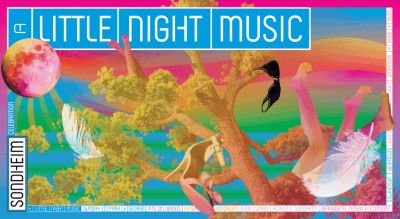
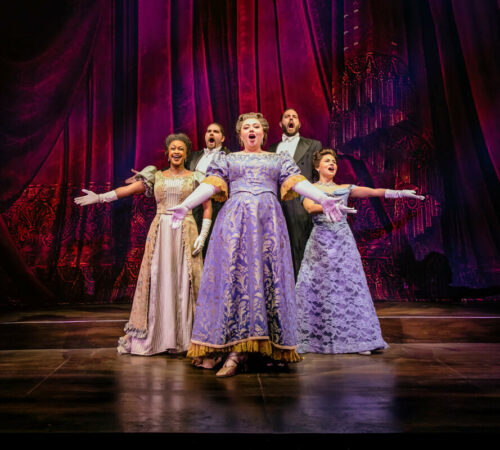
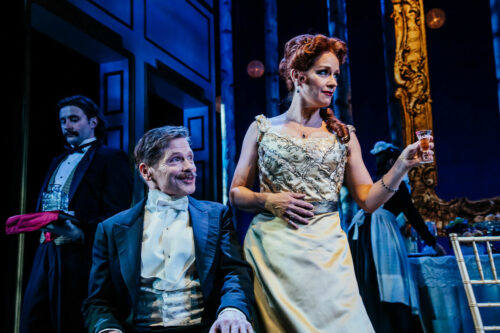
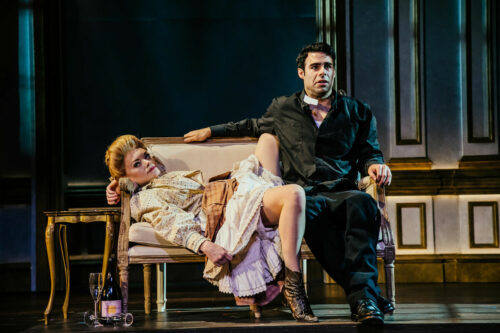

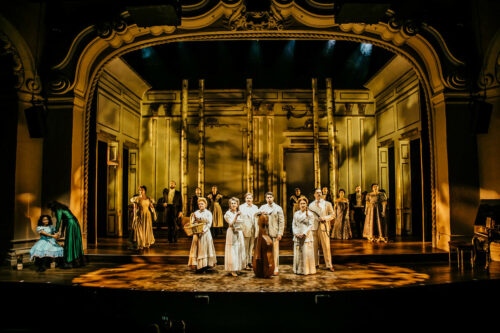
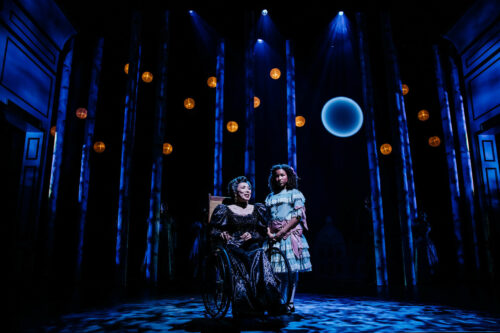
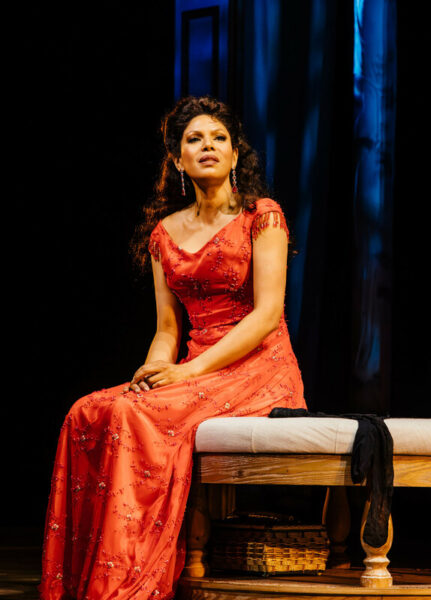

{ 2 comments… read them below or add one }
Saw it the other night. Loved it. Had never seen it. The only thing though was the vibrato by the ‘greek chorus’ was a little too much and made it difficult to understand the words. other than that, great costumes, great production! I love the Pasadena Playhouse. One of my favorite theaters cause of the comfy seats. Hey I’m old, that matters! Such great songs and the hilarious, witty dialogue was just spot on Sondheim!
Maddalena, I don’t think the quintet’s vibrato was the problem. Their DICTION was the problem.
Georgia Belmont, especially, was very difficult to understand. This is a common problem with operatically trained singers. Joan Sutherland, aka the “diva with no tongue”, was renowned for dropping consonants.